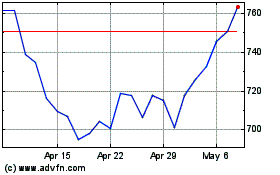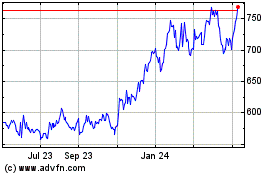Kaplan Survey: Most Buyer’s Agents Don’t Think New Commission Rules are a Good Thing, But are Ready to Face the Challenge
August 20 2024 - 7:55AM
Business Wire
The biggest change to hit the real estate industry in more than
30 years is being greeted with mixed reactions by the audience most
impacted. Before the changes went into effect on August 17,
seller’s agents and buyer’s agents would split a commission based
upon the final price of the home sale. But now, buyer’s agents'
commissions depend on what they negotiate with buyers themselves,
who never before had to pay their agents directly. This all changed
because of a landmark federal court ruling, which compelled the
National Association of Realtors to upend the long-existing
system.
Here’s the pulse of the profession, according to a new Kaplan
survey of 300 buyer’s agents*:
- Not Sold: Only 20 percent of buyer’s agents surveyed say
the new system, which shifts the burden of how buyer’s agents get
paid to the buyer’s agent themselves through negotiating with the
client, is “a positive change,” with 56 percent saying it’s not,
and the remaining 23 percent neutral. One buyer’s agent with a
negative outlook said, "Buyers typically don’t even have enough
money for their closing costs, much less now having to pay a
buyer's agent."
- Ready to Sell: Counterintuitively, 72 percent of buyer’s
agents consider themselves “prepared” to navigate the new
commission landscape, with 28 percent saying they aren’t
prepared.
- Perseverance: The new system has yet to cause any career
path changes of heart among buyer’s agents, the survey found. Only
4 percent of them say it will cause them to exit the industry; 66
percent said this change will not result in them exiting. The
remaining 30 percent were undecided. One buyer’s agent shared, “In
real estate, you face challenges with every transaction. This is
just another challenge to maneuver.”
Toby Schifsky, vice president of real estate education, Kaplan,
said:
“Remember that these commission changes were
thrust upon buyer’s agents by the courts, not drafted by the
grassroots of the industry, so it’s no surprise that Kaplan’s
survey found that most are unhappy with what’s just been
implemented. The new structure complicates their commission
structure, and may actually lead to hurting buyers, many of whom
may now believe they can’t afford an agent. This adds volatility to
an already uncertain housing market. At the same time, our survey
found that most agents feel prepared for these changes. While we
think many are prepared because they’ve taken courses and are
seasoned negotiators, they may discover it’s more challenging than
they originally guessed. Two things are for sure: The level of
professionalism will rise on the buyer’s side of transactions, and
it’s going to be a fierce market. This is not business as usual.
One survey result that also stands out is that 30 percent of
buyer’s agents are undecided if the change to the commission system
will result in them calling it quits. That’s a pretty big number
and represents a fair amount of indecision among agents. These
findings underline that we in the real estate education industry
have a responsibility to ensure that agents know what the changes
mean and how to quickly overcome any obstacles they may
encounter.”
Kaplan recently launched a Buyer Agency Professional™ (BAP™)
designation to help buyer agents succeed as they face a drastically
different real estate business model.
Contact russell.schaffer@kaplan.com to speak with a real estate
expert at Kaplan.
*The survey was conducted by Kaplan by email in July 2024 of 300
industry professionals who passed the real estate licensing exam
and currently work as buyer’s agents.
About Kaplan
Kaplan, Inc. is a global educational services company that helps
individuals and institutions advance their goals in an
ever-changing world. Our broad portfolio of solutions help students
and professionals further their education and careers, universities
and educational institutions attract and support students, and
businesses maximize employee recruitment, retainment, and
development. Stanley Kaplan founded our company in 1938 with a
mission to expand educational opportunities for students of all
backgrounds. Today, our thousands of employees working in 27
countries continue Stanley’s mission as they serve about 1.2
million students and professionals, 15,000 corporate clients, and
3,300 schools, school districts, colleges, and universities
worldwide. Kaplan is a subsidiary of the Graham Holdings Company
(NYSE: GHC). Learn more at kaplan.com.
Note to editors: Kaplan is a subsidiary of Graham Holdings
Company (NYSE: GHC)
View source
version on businesswire.com: https://www.businesswire.com/news/home/20240820552074/en/
Press: Russell Schaffer, russell.schaffer@kaplan.com X:
@KaplanEdNews
Graham (NYSE:GHC)
Historical Stock Chart
From Dec 2024 to Jan 2025

Graham (NYSE:GHC)
Historical Stock Chart
From Jan 2024 to Jan 2025
